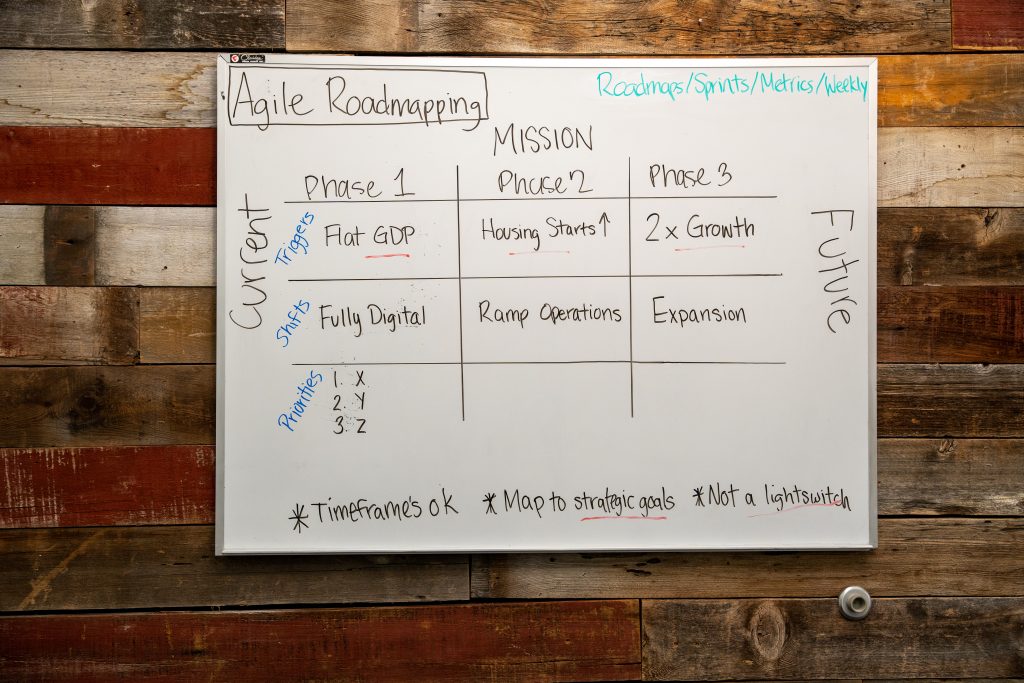Shift from timelines to trigger events. Gone are the days of subjective interpretations of projects and initiatives. Instead of operating on a set timeline, think about using trigger events. Action is taken when a specific, agreed-upon event is set to motion. Why? Trigger events are objective, quantifiable and predetermined.

Video Transcription
Today’s Whiteboard Video is on agile roadmapping. This is part of our series on agile strategy or agile strategic planning. We have a four-part framework: roadmaps, agile roadmaps, strategy sprints, health metrics and weekly health check-ins or Metric Mondays.
What is Agile Roadmapping?
Let’s talk about agile roadmapping and what it is. To be clear, we’re zooming in to your one-page strategic plan. So this is a piece of your one-page strategic plan, which has your mission, why you exist; where you are today, your current state, your SWOT; and most importantly, where you’re going—that vision or future state.
Trigger Events
Agile roadmaps are different because instead of timelines, which are pretty standard as a roadmap normally has Year 1, Year 2, and Year 3, we’re shifting from timelines to triggers or trigger events.
Not only are we saying the roadmap is based on trigger events, but those trigger events are maps to a phase. We have Phase 1, Phase 2, and Phase 3. We love three-part roadmaps–so why not have them? A tip or trick—name your phases. That helps your organization stay anchored to what phase you’re in. So next, we identify trigger events. Within that phase, we have shifts. These are strategic shifts you are making or have to make in order to react and respond to the phase. And then, what are your priorities organizationally within that phase? This is a pretty simple roadmap, with a swim lane for trigger events, a swim lane for shifts, and then a swim lane for priorities.
Internal and External Trigger Events
What are trigger events? Trigger events come in two parts or two types. There are external or market trigger events, and then there are internal trigger events or performance trigger events. Neither is good or bad, they’re just different. What matters is that the trigger event is objective and verifiable. If it’s not objective and verifiable, it won’t work, and your team will get super confused. You need to know objectively that said event put you squarely in a specific phase.
Examples
For example, the phase you’re currently in may have the trigger event you have. Like, there’s flat GDP or flat Gross Domestic Product growth. That is an objective, verifiable trigger event, right? You know you’re shifting into the next phase, potentially, if housing starts to increase. That’s an example of an external or market trigger event. A market trigger event matters in terms of what’s driving your business. So what drives your business? What’s an indicator within your market that things are shifting or changing? This is just an example, potentially, if you’re in construction.
Then maybe you’re shifting into Phase 3, when you’ve seen two consistent periods, maybe it’s months or maybe it’s quarters, it depends on the pace of your business, of growth. That’s when you’re shifting into the next phase. So you can have a mixture of external and internal, doesn’t really matter. And then, what’s super important is just what has to shift and change strategically in your organization when you’re in this phase. For example, if you’re a construction business, housing starts to increase, again, maybe it’s two periods of increase or maybe even three or four, whatever you’re comfortable with. And maybe that’s a leading indicator, or an early warning sign of a market recovery for you, hypothetically. Your shift would be ramping operations. Maybe you moved to fully digital (Phase 1), and now, you’re ramping operations (Phase 2), and then you’re expanding (Phase 3). That’s just an example. And then, what are the handful of priorities that your team needs to align around within said phase? So that’s an agile roadmap.
Tip 1: Sticking to Phases
Let’s just wrap it up with a couple of tips. Shifting from right, timeframes to trigger events is the magic of an agile roadmap, and it is. However, we know that finance and budget need timeframes. If you must, you can add some months here, if that really helps you. But just use them as guidelines, not as actual timelines in your roadmap. Let’s stick with phases instead of years.
Tip 2: Mapping to Strategic Goals
The other thing is you might consider mapping to strategic goals. Instead of having loose priorities here, you might actually have specific rows for your long-term goals, so you have clear priorities within each goal. That keeps the long-term and the short-term connected.
Tip 3: It’s not a light switch
And then lastly, it’s not a light switch. It’s entirely possible that you’re in between a couple of phases. You may start to work on things in Phase 2, but you’re not totally moved over into Phase 2 yet. Don’t debate that. It’s not really worth it. Just remember, this is directional, not concrete and specific.
So with that, that’s how you shift from a standard roadmap to an agile roadmap. Check out the rest of our videos for the other components of our framework.
Thanks for tuning in. If you haven’t subscribed to our channel, please do so. Check us out on Facebook. Subscribe to our newsletter. Happy strategizing.
Agile Roadmapping Roadmaps / Sprints / Metrics / Weekly
| Agile Roadmapping | Roadmaps / Sprints / Metrics / Weekly | ||||
|
Current |
Phase 1 | Phase 2 | Phase 3 |
Future |
|
| Triggers | Flat GDP | Housing Starts Increasing | 2x Growth | ||
| Shifts | Fully Digital | Ramp Operations | Expansion | ||
| Priorities |
|
||||
| *Timeframe’s OK | *Map to strategic goals | *Not a light switch | |||












